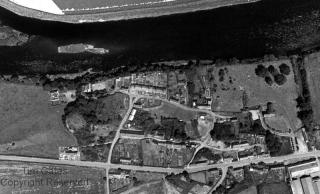| |

|
| |

|
Wark Castle is private property and there is no access onto the monument. It can be
clearly viewed from the road into the village, where a small interpretation panel has
been placed, and also from a public footpath which runs immediately adjacent to the castle at the west end.
Find out how big Wark Castle was, return to the decline of Wark Castle
or to Wark Castle home page.
|
|
|
Wark Archive: Wark Castle Today
The visible remains of Wark Castle largely relate to the 16th century building phases as the medieval castle was
partly destroyed and remodelled on a number of occasions. The remains of the artillery platform known as The Ring and
the south curtain wall are most easily visible. The Ring lies at the west end of the castle complex; it sits on top
of an earthen mound which was probably part of the original motte. The masonry cladding of The Ring can best be seen
on the west side; nearly all of the facing stones have been robbed for other buildings, but the masonry core still
survives to an impressive height.
The footings of the mound and Ring on the north side are supported by a modern
retaining wall to prevent further collapse of the monument. To the west of the mound and Ring, a defensive ditch
cutting through the kaim is clearly visible. The south curtain wall, sitting on top of the kaim ridge, can also be
clearly seen although it is covered with dense vegetation. Between the mound and the road to the east lies the raised
area which included the middle and possibly the outer bailey; there are no structures visible in this area although
remains may survive beneath the ground. Some remnants of the north curtain wall, overlooking the river, do survive
but they are located in private gardens and cannot be seen.
|
|